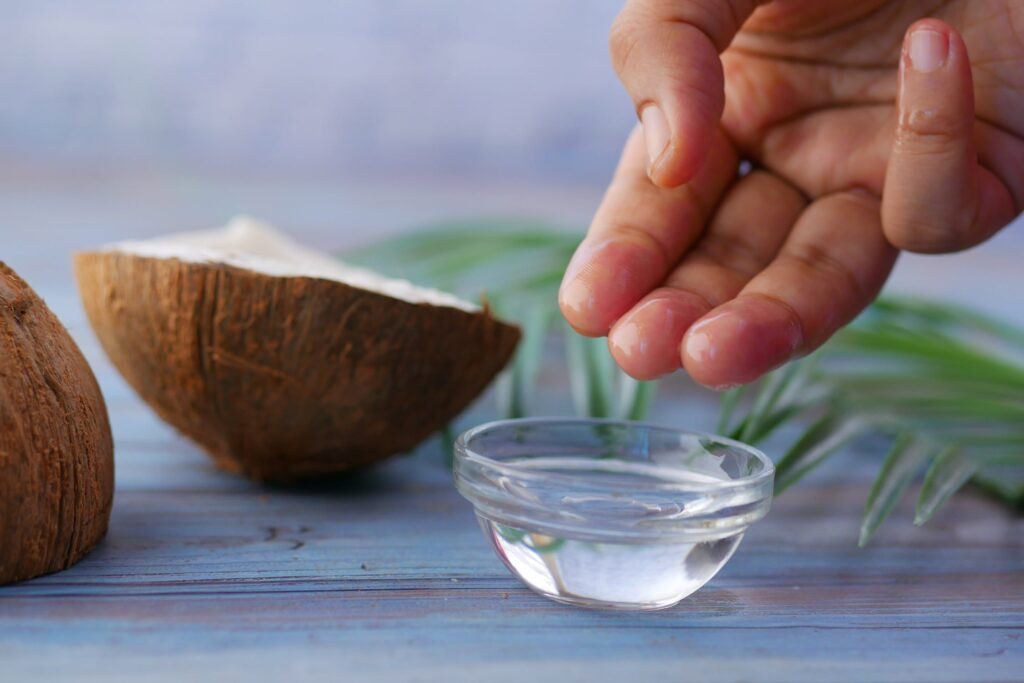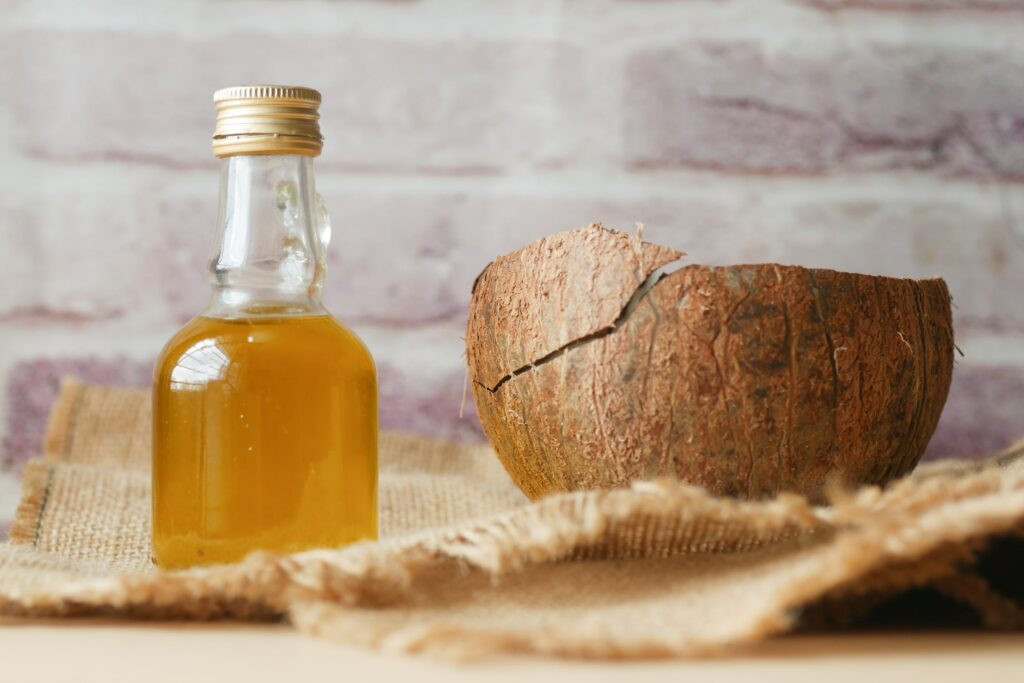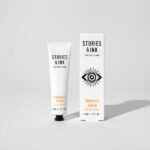Can you put coconut oil on a fresh tattoo? Yes, you absolutely can! Coconut oil is a fantastic natural option for tattoo aftercare, offering a multitude of benefits to keep your new ink vibrant and healthy, and it can even be used on older tattoos to keep them looking fresh. At tattooat.com, we’re dedicated to providing you with the best insights on tattoo care, ensuring your body art remains a stunning expression of yourself for years to come. Explore with us the benefits of coconut oil for tattoo healing, proper application techniques, and why it’s a beloved choice among tattoo enthusiasts.
1. What Makes Coconut Oil a Good Choice for Tattoo Aftercare?
Coconut oil is celebrated for its moisturizing, antibacterial, and anti-inflammatory properties, making it an excellent choice for tattoo aftercare. Here’s a breakdown of its benefits:
- Moisturization: Coconut oil is a rich emollient, locking in moisture to keep the skin hydrated, which is crucial for healing.
- Antibacterial Properties: The lauric, capric, and caprylic acids in coconut oil can help protect against infections.
- Anti-Inflammatory Effects: It can reduce redness, swelling, and discomfort during the healing process.
 Applying coconut oil on a fresh tattoo for hydration and protection
Applying coconut oil on a fresh tattoo for hydration and protection
According to a study published in the “Food and Chemical Toxicology” journal, coconut oil enhances skin barrier functions and has anti-inflammatory effects.
2. How to Properly Apply Coconut Oil on a New Tattoo?
Applying coconut oil correctly is vital for maximizing its benefits and ensuring proper tattoo healing. Follow these steps:
- Wash Your Hands: Always start with clean hands to prevent introducing bacteria to the tattoo area.
- Clean the Tattoo: Gently cleanse the tattoo with a mild, fragrance-free soap and water.
- Pat Dry: Use a clean paper towel to pat the area dry. Avoid rubbing, as this can irritate the skin.
- Apply a Thin Layer: Take a small amount of coconut oil and gently apply a very thin layer over the tattoo. Remember, less is more; you want the skin to breathe.
- Repeat as Needed: Apply 2-3 times daily or as needed to keep the tattoo moisturized.
3. What Are the Benefits of Using Coconut Oil on Fresh Tattoos?
Using coconut oil on fresh tattoos offers a wide array of benefits. From keeping the skin moisturized to potentially fighting off infections, this natural remedy is a tattoo enthusiast’s dream. Let’s explore the advantages:
- Intense Hydration: Coconut oil deeply moisturizes, preventing dryness and cracking, which are common issues during the tattoo healing phase.
- Protection Against Microorganisms: The antibacterial properties of coconut oil help protect the new tattoo from potential infections.
- Anti-Inflammatory Action: It reduces inflammation, making the healing process more comfortable and less irritating.
- Supports Skin Cell Production: Coconut oil is believed to help the body fight free radicals and support healthy skin cell production.
- Natural and Gentle: Being a natural product, it’s suitable for various skin types, including sensitive skin.
4. Are There Any Risks Associated with Using Coconut Oil on Tattoos?
While coconut oil is generally safe, some risks should be considered:
- Allergic Reactions: Although rare, allergies to coconut oil can occur. Perform a patch test before applying it to the entire tattoo area.
- Over-Moisturization: Applying too much coconut oil can trap moisture and potentially lead to bacterial growth. Use a thin layer and allow the skin to breathe.
- Clogged Pores: Coconut oil can be comedogenic for some individuals, meaning it might clog pores and cause breakouts around the tattoo.
 Sanibalm, a tattoo balm with coconut oil, shea butter, and sea buckhorn
Sanibalm, a tattoo balm with coconut oil, shea butter, and sea buckhorn
If you notice any signs of irritation, discontinue use immediately and consult with a tattoo artist or dermatologist.
5. What Are the Alternatives to Coconut Oil for Tattoo Aftercare?
If coconut oil doesn’t suit you, several alternatives can also promote tattoo healing:
- Sanibalm: A specially formulated balm containing coconut oil, shea butter, and sea buckhorn for intense hydration and protection. Find it at tattooat.com.
- Aquaphor: A popular choice among tattoo artists, Aquaphor provides a protective barrier to promote healing.
- Tattoo-Specific Balms: Many tattoo aftercare products are available, often containing natural ingredients like aloe vera and vitamin E.
- Fragrance-Free Lotions: Opt for hypoallergenic, fragrance-free lotions to keep the tattoo moisturized without causing irritation.
6. Can Coconut Oil Improve the Appearance of Older Tattoos?
Yes, coconut oil can rejuvenate older tattoos by:
- Enhancing Vibrancy: Regular application can keep the skin moisturized, making the tattoo ink appear brighter.
- Preventing Fading: By keeping the skin supple, coconut oil can help prevent the ink from fading over time.
- Reducing Dryness: It combats dryness and flakiness, which can dull the appearance of older tattoos.
Incorporating coconut oil into your skincare routine can help maintain the beauty of your tattoos for years.
7. What Types of Coconut Oil Are Best for Tattoo Care?
When choosing coconut oil for tattoo care, opt for:
- Virgin Coconut Oil: This is the least processed form, retaining more of its natural benefits.
- Organic Coconut Oil: Ensures that the oil is free from pesticides and other harmful chemicals.
- Unrefined Coconut Oil: This type maintains its natural scent and properties.
Avoid coconut oils with added fragrances or chemicals, as these can irritate the tattoo.
8. How Does Coconut Oil Compare to Other Tattoo Aftercare Products?
Coconut oil stacks up well against other aftercare products:
| Feature | Coconut Oil | Aquaphor | Tattoo Balms |
|---|---|---|---|
| Ingredients | Natural, typically just coconut oil | Petrolatum, mineral oil, lanolin alcohol | Natural oils, butters, and extracts |
| Moisturizing | Excellent | Excellent | Excellent |
| Antibacterial | Good | Minimal | Varies depending on ingredients |
| Skin Sensitivity | Generally safe, but allergies are possible | Generally safe, but can cause allergic reactions in some | Generally safe, but check for specific allergen concerns |
| Affordability | Affordable | Affordable | Can be more expensive |
| Breathability | Good, when applied thinly | Can be occlusive, trapping moisture | Good, depending on the formulation |
Coconut oil is a cost-effective, natural option, but individual preferences and skin sensitivities should guide your choice.
9. What Do Tattoo Artists and Dermatologists Say About Using Coconut Oil?
Most tattoo artists and dermatologists agree that coconut oil is a safe and effective option for tattoo aftercare, provided you are not allergic. They often recommend it for its moisturizing and antibacterial properties. However, it’s crucial to follow their specific aftercare instructions, as individual recommendations may vary.
Portland State University’s Art Department, in July 2025, confirms that many local tattoo artists recommend coconut oil for its natural healing properties and minimal risk of adverse reactions.
10. How Can tattooat.com Help You with Your Tattoo Journey?
At tattooat.com, we’re committed to providing you with everything you need for a successful tattoo experience:
- Extensive Design Gallery: Explore thousands of tattoo designs to find your perfect inspiration.
- Curated Artist Directory: Discover talented tattoo artists and reputable studios across the USA, including Portland.
- In-Depth Aftercare Guides: Access detailed articles and guides on tattoo aftercare, including the use of coconut oil and other products.
- Expert Advice: Get insights and tips from tattoo professionals to ensure your tattoo heals beautifully.
Ready to start your tattoo journey? Visit tattooat.com today to explore designs, find artists, and learn everything you need to know about tattoo care!
11. What Are the Latest Tattoo Trends in the USA?
Stay updated with the latest tattoo trends sweeping across the USA:
- Minimalist Tattoos: Simple, elegant designs are gaining popularity for their understated beauty.
- Watercolor Tattoos: These vibrant, artistic tattoos mimic the look of watercolor paintings.
- Geometric Tattoos: Intricate geometric patterns are a modern and eye-catching choice.
- Botanical Tattoos: Floral and plant-inspired designs continue to be a timeless favorite.
- Blackwork Tattoos: Bold, black ink designs are making a statement.
According to Inked Magazine, minimalist and blackwork tattoos are particularly trending in cities like Portland.
12. What Are Common Tattoo Aftercare Mistakes to Avoid?
Avoid these common mistakes to ensure proper tattoo healing:
- Using Harsh Soaps: Opt for gentle, fragrance-free cleansers.
- Over-Moisturizing: Apply a thin layer of aftercare product to allow the skin to breathe.
- Picking or Scratching: Resist the urge to touch or scratch the tattoo, as this can lead to infection and scarring.
- Sun Exposure: Protect the tattoo from direct sunlight, as UV rays can fade the ink.
- Ignoring Artist Instructions: Follow your tattoo artist’s specific aftercare guidelines.
13. What Are Some Home Remedies for Tattoo Healing?
Besides coconut oil, consider these home remedies for tattoo healing:
- Aloe Vera: Soothes and moisturizes the skin, reducing inflammation.
- Calendula: Promotes healing and has antiseptic properties.
- Honey: A natural antibacterial and anti-inflammatory agent.
- Oatmeal Baths: Relieve itching and irritation.
Always consult with your tattoo artist before using any home remedies.
14. How to Choose the Right Tattoo Artist?
Choosing the right tattoo artist is crucial for a positive experience:
- Review Their Portfolio: Look at their previous work to ensure their style matches your vision.
- Read Reviews: Check online reviews to gauge their reputation and professionalism.
- Visit the Studio: Ensure the studio is clean and sterile.
- Ask Questions: Don’t hesitate to ask about their experience, techniques, and aftercare procedures.
- Trust Your Gut: Choose an artist you feel comfortable with and who understands your tattoo goals.
15. What Are the Best Tattoo Placement Options?
Consider these factors when choosing a tattoo placement:
- Pain Level: Some areas are more sensitive than others.
- Visibility: Decide how visible you want the tattoo to be.
- Design Flow: Choose a placement that complements the design.
- Skin Elasticity: Areas with more skin movement may cause the tattoo to fade faster.
- Professional Considerations: Consider any workplace restrictions on visible tattoos.
16. How to Prepare for Your First Tattoo Appointment?
Proper preparation can make your first tattoo experience smoother:
- Stay Hydrated: Drink plenty of water in the days leading up to your appointment.
- Avoid Alcohol and Blood Thinners: These can increase bleeding during the procedure.
- Eat a Good Meal: Ensure you’re well-fed to prevent lightheadedness.
- Wear Comfortable Clothing: Choose clothing that allows easy access to the tattoo area.
- Bring Entertainment: A book, music, or podcast can help distract you during the session.
17. How to Protect Your Tattoo from Sun Damage?
Protecting your tattoo from the sun is essential for preventing fading:
- Use Sunscreen: Apply a broad-spectrum, high-SPF sunscreen to the tattoo whenever it’s exposed to sunlight.
- Wear Protective Clothing: Cover the tattoo with clothing when possible.
- Avoid Tanning Beds: Tanning beds can cause significant damage to tattoo ink.
- Seek Shade: Stay in the shade during peak sun hours.
18. How to Deal with Tattoo Itching?
Tattoo itching is a common part of the healing process:
- Moisturize Regularly: Keep the tattoo hydrated to relieve itching.
- Avoid Scratching: Scratching can damage the tattoo and lead to infection.
- Apply a Cold Compress: A cool compress can help soothe the skin.
- Wear Loose Clothing: Avoid tight clothing that can rub against the tattoo.
- Consult Your Artist: If the itching is severe or accompanied by other symptoms, consult your tattoo artist or a healthcare professional.
19. What Are the Best Foods to Eat for Tattoo Healing?
A healthy diet can support tattoo healing:
- Protein-Rich Foods: Help repair and rebuild skin cells.
- Vitamin C-Rich Foods: Boost collagen production.
- Zinc-Rich Foods: Support immune function and wound healing.
- Hydrating Foods: Keep the skin hydrated from the inside out.
- Anti-Inflammatory Foods: Reduce inflammation and promote healing.
20. How Can You Tell If Your Tattoo Is Infected?
Recognize the signs of a tattoo infection:
- Excessive Redness: More than usual or spreading redness.
- Swelling: Significant swelling around the tattoo area.
- Pain: Increased or throbbing pain.
- Pus or Drainage: Yellow or green discharge.
- Fever: Feeling feverish or experiencing chills.
- Foul Odor: An unpleasant smell coming from the tattoo area.
If you suspect an infection, seek medical attention immediately.
FAQ About Using Coconut Oil on Tattoos
Can I use coconut oil on a fresh tattoo?
Yes, you can use coconut oil on a fresh tattoo to moisturize and protect it, provided you’re not allergic.
How often should I apply coconut oil to my tattoo?
Apply a thin layer 2-3 times daily, or as needed to keep the tattoo moisturized.
Is coconut oil better than other tattoo aftercare products?
Coconut oil is a natural and affordable option, but it depends on individual preferences and skin sensitivities.
Can coconut oil help with tattoo itching?
Yes, coconut oil can help relieve tattoo itching due to its moisturizing and anti-inflammatory properties.
What type of coconut oil is best for tattoos?
Virgin, organic, and unrefined coconut oil is best for tattoo care.
Can coconut oil make my tattoo fade?
No, coconut oil can help prevent fading by keeping the skin moisturized and healthy.
Is it safe to use coconut oil if I have sensitive skin?
Yes, coconut oil is generally safe for sensitive skin, but perform a patch test first.
Can coconut oil prevent tattoo infections?
Coconut oil’s antibacterial properties can help reduce the risk of infection, but it’s not a substitute for proper hygiene.
What should I do if I have an allergic reaction to coconut oil?
Discontinue use immediately and consult with a tattoo artist or dermatologist.
Can I use coconut oil on old tattoos?
Yes, coconut oil can help rejuvenate and enhance the appearance of old tattoos.
Ready to take the next step in your tattoo journey? Explore designs, find artists, and learn more at tattooat.com! Address: 1825 SW Broadway, Portland, OR 97201, United States. Phone: +1 (503) 725-3000. Website: tattooat.com.

